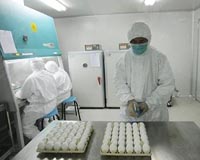| . |  |
. |
Bangkok (AFP) Sept 24, 2009 An experimental AIDS vaccine has for the first time cut the risk of infection in humans in what scientists Thursday called a "breakthrough" in the quarter-century fight against the epidemic. The vaccine reduced the chance of being infected by a third, researchers announced after the world's largest trial of 16,000 volunteers, carried out by the US Army and Thailand's Ministry of Public Health. The surprising result comes after years of fruitless attempts by the medical world to find an HIV vaccine, including one trial jab that apparently boosted infection rates. "It is the first demonstration that a vaccine against HIV can protect against infection," Colonel Jerome Kim of the US military HIV research programme told a news conference in Bangkok via videolink. "This is a very important scientific advance and gives us hope that a globally effective vaccine may be possible in the future," he said. Thai Public Health Minister Witthaya Kaewparadai said the "outcome of this study is a scientific breakthrough." The vaccine was a combination of two older drugs that had not reduced infection on their own and the researchers said they were now studying why the two apparently worked together. The study combined the canarypox vaccine ALVAC, manufactured by Sanofi-Aventis of France, and AIDSVAX, originally made by VaxGen Inc and now licensed to the non-profit Global Solutions for Infectious Diseases. Researchers said the latest vaccine showed a 31.2 percent efficacy in reducing the risk of HIV infection. "The outcome represents a breakthrough in HIV vaccine development because for the first time ever there is evidence that HIV vaccine has preventative efficacy," said the research team in a statement. The vaccine was tested on volunteers -- all HIV negative men and women aged from 18 to 30 -- at average risk of infection in two Thai provinces near Bangkok starting in October 2003. Half received the vaccine and the rest were given a placebo. Out of the placebo recipients 74 of 8,198 became infected compared with 51 of 8,197 who got the vaccine. The World Health Organization and the Joint UN Programme on HIV/AIDS congratulated the researchers for the "encouraging" results. "The study results, representing a significant scientific advance, are the first demonstration that a vaccine can prevent HIV infection in a general adult population and are of great importance," they said in a statement. The UN said it may not be possible to get licensing permission for the drug at the moment based on the results, and that further studies were needed to determine if the vaccine has the same effect in other parts of the world. AIDS first came to public notice in 1981 and has since killed at least 25 million people worldwide, and 33 million others are living with AIDS or the HIV virus. Swift progress in identifying the virus that caused AIDS unleashed early optimism that a vaccine would quickly emerge. HIV destroys immune cells and exposes the body to opportunistic disease. But out of the 50 candidates that have been evaluated among humans, only two vaccines have made it through all three phases of trials, and both were flops. About 30 vaccines remain in the pipeline. Scientists were in 2007 forced to abandon two advanced clinical trials of a vaccine by pharmaceutical company Merck after it appeared to actually heighten the risk of AIDS infection. Sanofi Pasteur, the vaccines division of Sanofi-Aventis, said the results of the latest test, although "modest", were the first concrete demonstration that a vaccine "could one day become a reality." The Global HIV Vaccine Enterprise, an alliance of researchers, policymakers, donors and advocates that includes the Bill and Melinda Gates Foundation, said it was a "historic day in the 26-year quest to develop an AIDS vaccine." The International AIDS Vaccine Initiative (IAVI), an organisation that promotes the search for a vaccine, said the trial results were "very exciting and a significant scientific achievement." The head of the US agency tasked with controlling the spread of infectious disease said it was an important breakthrough. "These new findings represent an important step forward in HIV vaccine research," said Anthony Fauci, director of the National Institute of Allergy and Infectious Diseases (NIAID), part of the US National Institutes of Health, which provided major funding and logistical support for the study. But a top AIDS scientist, France's Jean-Francois Delfraissy, warned that the results were "good news but the effect remains modest". burs-pst Share This Article With Planet Earth
Related Links Epidemics on Earth - Bird Flu, HIV/AIDS, Ebola
 WHO cuts swine flu vaccine production estimate
WHO cuts swine flu vaccine production estimateGeneva (AFP) Sept 24, 2009 The World Health Organization said Thursday that pharmaceutical firms can produce only three billion doses of swine flu vaccines a year, covering less than half of the global population. However, tests show that just one jab would offer sufficient protection against the A(H1N1) virus and that the vaccine is as safe as seasonal flu vaccines. "Outcomes of trials completed to date suggest ... read more |
|
| The content herein, unless otherwise known to be public domain, are Copyright 1995-2009 - SpaceDaily. AFP and UPI Wire Stories are copyright Agence France-Presse and United Press International. ESA Portal Reports are copyright European Space Agency. All NASA sourced material is public domain. Additional copyrights may apply in whole or part to other bona fide parties. Advertising does not imply endorsement,agreement or approval of any opinions, statements or information provided by SpaceDaily on any Web page published or hosted by SpaceDaily. Privacy Statement |